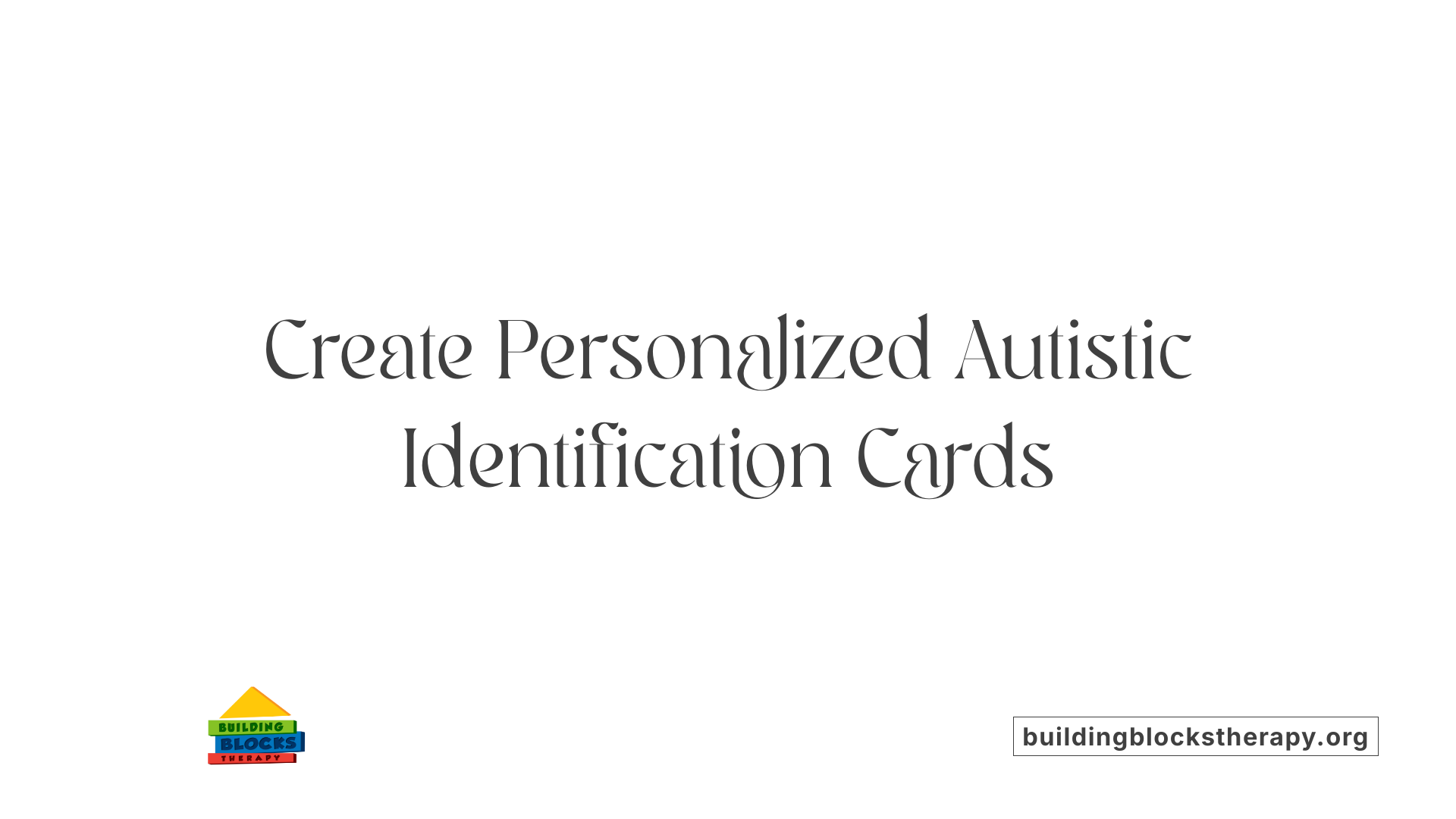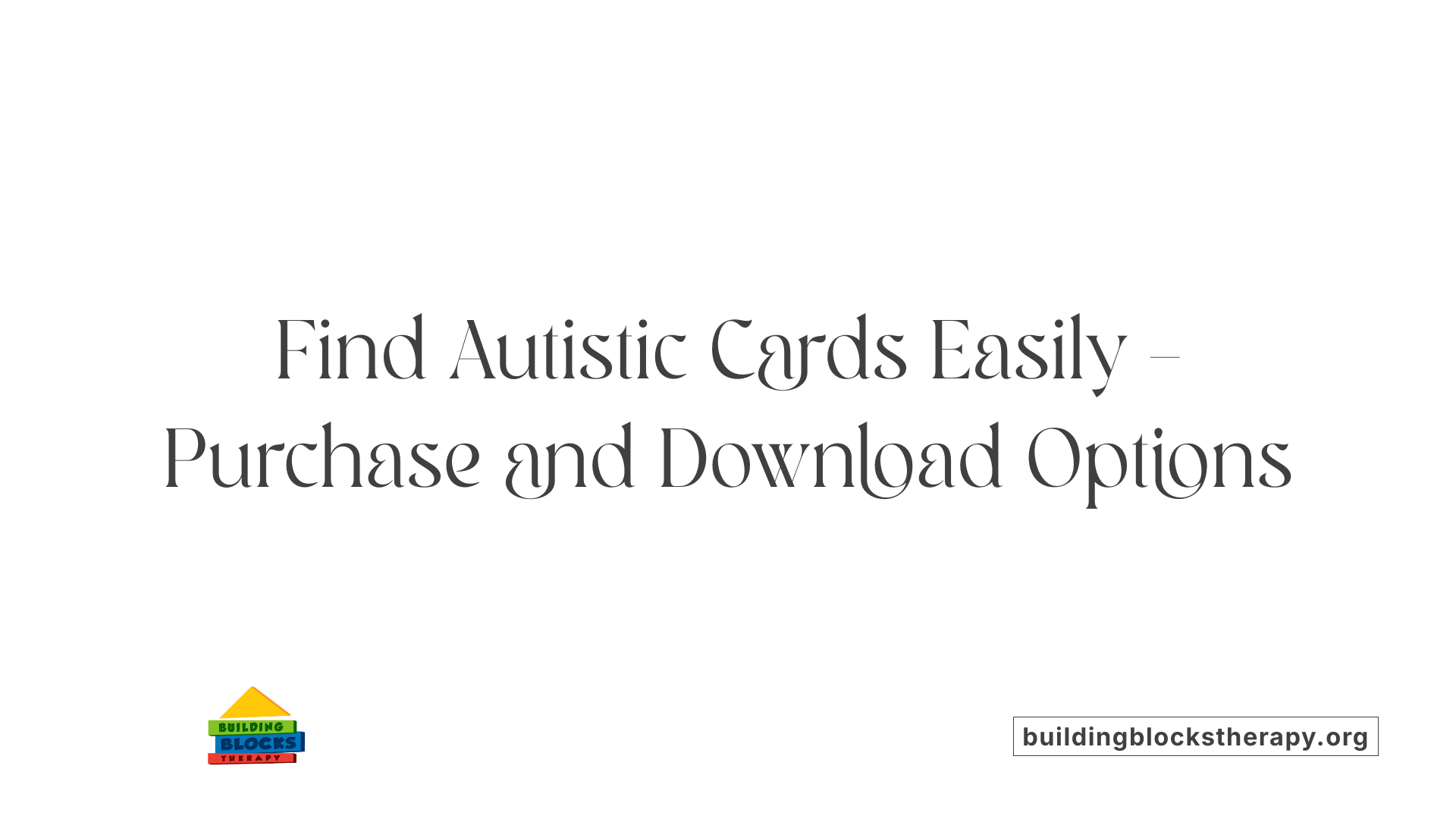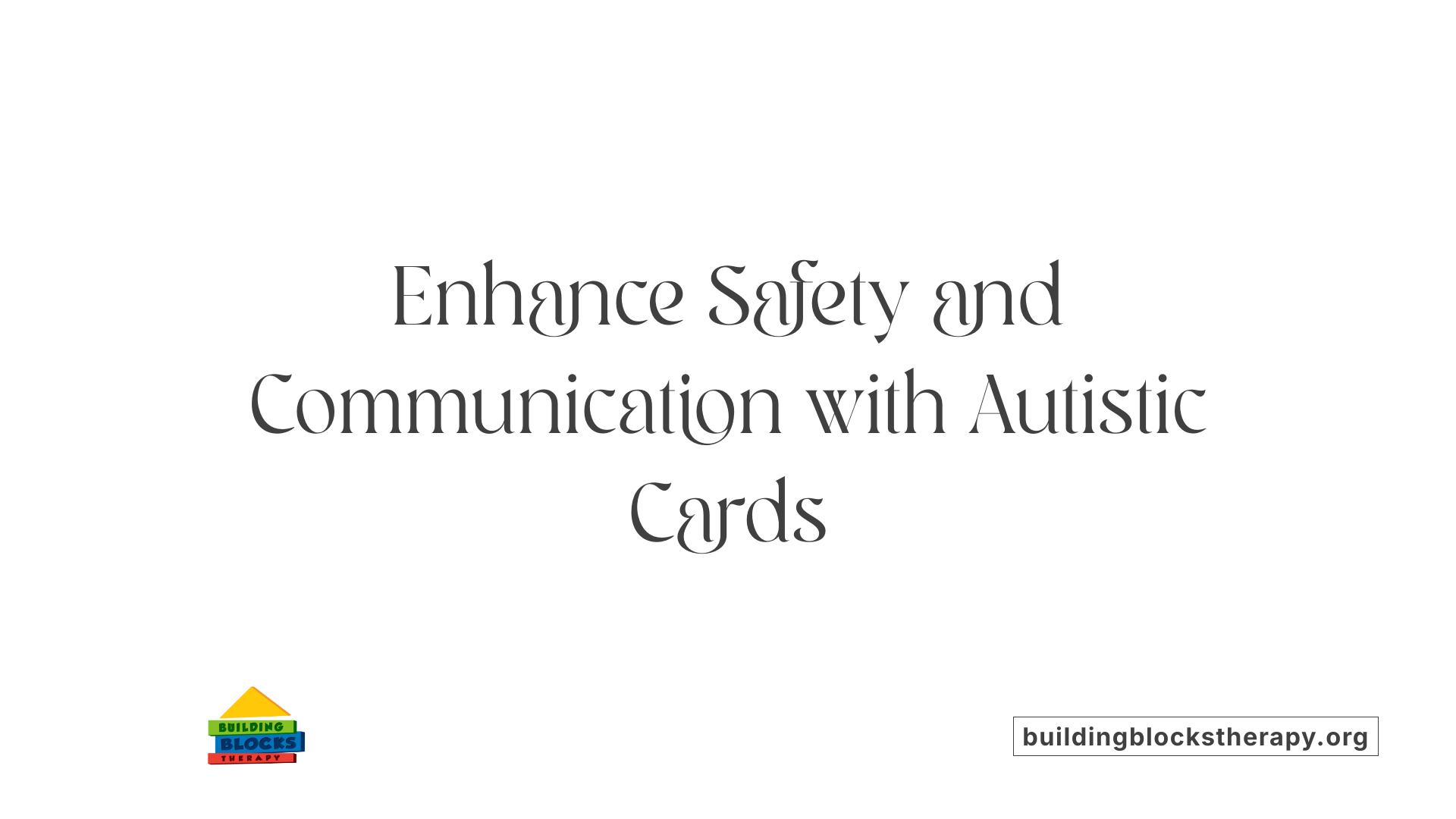Understanding the Role of Autistic Cards in Supporting Individuals with Autism
Autistic Cards serve as practical tools to foster understanding and safety for individuals with autism across various environments. Created to facilitate communication, these identification cards help reduce anxiety, prevent misunderstandings, and promote supportive interactions. This article explores what Autistic Cards are, how to obtain or create them, their benefits, options for purchasing, and resources available to raise autism awareness.
What Are Autistic Cards and Their Purpose?
What are Autistic Cards and what is their purpose?
Autistic Cards are small identification cards created to share essential information about individuals with autism. They serve as helpful communication tools, especially in public or emergency situations, by providing quick access to details such as the person’s diagnosis, communication preferences, sensory sensitivities, and emergency contacts.
Designed to reduce discomfort and misunderstandings, these cards aim to foster more supportive and respectful interactions between autistic individuals and others—whether it’s store staff, teachers, police officers, or emergency responders. They are especially useful when the individual cannot communicate verbally, helping others understand their needs and how to assist them properly.
These cards are suitable for everyone, including children, teenagers, and adults, who may face challenges during social encounters. They illustrate the person’s specific needs, making it easier for caretakers and bystanders to provide appropriate support.
Autistic Cards are provided both as physical business card-sized items and digital downloads. They often come in packs of 50 from organizations like the National Autism Association. Users can also personalize these cards using templates or apps, sometimes incorporating additional information such as photos or special instructions.
Overall, these cards promote safety, enhance understanding, and support seamless interactions across various environments.
| Purpose | Description | Examples |
|---|---|---|
| Improve Communication | Help others understand the individual’s needs and preferences | Supports non-verbal communication, clarifies sensory sensitivities |
| Increase Safety | Assist in emergencies or police interactions | Contains emergency contacts, medical info |
| Reduce Frustration | Minimize misunderstandings and foster patience | Explains autism to unfamiliar people |
| Promote Respect | Encourage respectful and supportive interactions | Educates the public about autism |
How to Obtain, Create, and Customize Autistic Cards
 There are various ways to obtain or create an autistic card, which can be an essential tool for communication and safety. If you prefer a DIY approach, you can design personalized cards using online templates and printable resources. These templates often allow you to include important information such as communication preferences, sensory sensitivities, and emergency contacts.
There are various ways to obtain or create an autistic card, which can be an essential tool for communication and safety. If you prefer a DIY approach, you can design personalized cards using online templates and printable resources. These templates often allow you to include important information such as communication preferences, sensory sensitivities, and emergency contacts.
Alternatively, pre-made autism identification cards are available for purchase from organizations focused on autism awareness, such as the National Autism Association, or various online vendors. These cards are business card-sized, come in packs of 50, and are ready to use after customization.
Digital options also exist for more convenience. For example, apps like My Family ID enable you to store detailed support information, biometric data, and emergency contacts on a smartphone. Such apps allow instant sharing of critical information with first responders during emergencies.
In some regions, official autism ID cards are issued through formal processes. For instance, in Alabama, families can obtain official cards by registering with the local health department and providing documentation from healthcare providers. These official cards can be carried at all times to help emergency responders quickly understand the individual’s needs.
Creating a physical card involves assembling materials such as printed photographs, laminated sheets, and attaching them to keyrings for portability. Digital cards or profiles can be stored within support apps or on mobile devices for quick access.
Whether physical or digital, these identification tools are designed to facilitate safer and more respectful interactions during emergencies and everyday situations. They are especially vital if the individual cannot communicate verbally, ensuring support needs are understood and assistance is provided.
| Method | Description | Additional Details |
|---|---|---|
| DIY Templates | Use online printable templates to create personalized cards | Include communication info, sensitivities, emergency contacts |
| Pre-made Cards | Purchase from organizations or commercial vendors | Pack of 50 cards, customizable with personal info |
| Digital Support | Use apps like My Family ID to store info | Share instantly with emergency services, include biometric data |
| Official ID Cards | Obtain through regional health departments | Require registration and healthcare documentation |
These options provide flexible solutions tailored to individual needs and regional procedures, offering valuable support in safety and communication.
Accessibility and Purchase Options for Autistic Cards
 Autistic cards are widely accessible through various online retailers and organizations focused on autism awareness, such as the National Autism Association. These cards are designed to support autistic individuals by providing important information about their diagnosis, communication preferences, sensory sensitivities, and emergency contacts. Many organizations offer flexible options for customization, allowing users to tailor cards according to personal needs or circumstances.
Autistic cards are widely accessible through various online retailers and organizations focused on autism awareness, such as the National Autism Association. These cards are designed to support autistic individuals by providing important information about their diagnosis, communication preferences, sensory sensitivities, and emergency contacts. Many organizations offer flexible options for customization, allowing users to tailor cards according to personal needs or circumstances.
Bulk orders are also available, often with discounts, making it easier for families and support groups to obtain multiple cards at once. Shipping options include free delivery within regions such as the UK, while international shipments might vary depending on global logistics.
There are different types of cards for distinct groups, such as cards for the individuals with autism, their children, or supporters like caregivers and teachers. Each card type can be customized to include specific details or declarations, such as mask exemptions or communication methods, ensuring the individual’s needs are clearly communicated to authorities, caregivers, and the public.
Overall, these cards serve as essential tools to promote understanding, reduce misunderstandings, and facilitate safe and respectful interactions. They are available both for purchase and free download, giving users flexibility in how they obtain and utilize them. Whether you shop online, order from dedicated organizations, or download templates for personal printing, autistic identification cards help create a more inclusive environment.
Benefits and Practical Use of Autistic Cards in Daily Life and Emergencies

What are the benefits of using Autistic Cards in social and safety situations?
Autistic Cards serve as a valuable tool to improve communication and safety for individuals with autism. These business card-sized cards, often provided in packs of 50 by organizations like the National Autism Association, contain important information about the person's diagnosis, communication preferences, sensory sensitivities, and emergency contacts. When used in daily interactions, such as at school, social events, or public places, they help others understand that the individual may need extra time or patience, reducing feelings of confusion or frustration.
In emergency or police encounters, these cards are especially useful. They can quickly inform first responders about the person's needs and limitations if they are unable to communicate verbally. This knowledge can lead to safer and more respectful treatment, potentially preventing misunderstandings or distress.
By incorporating these cards alongside other interventions like social skills training, virtual reality, or digital games, autistic individuals can navigate social situations more comfortably. The cards promote better understanding, helping to establish trust and cooperation.
Moreover, families and individuals can customize these cards using templates or apps, such as one developed by the Pennsylvania State Police, ensuring the information is specific to their needs. Both free downloads and purchase options are available through dedicated websites.
In sum, autistic identification cards are a simple yet effective resource that enhances communication, fosters safety, and supports social understanding for autistic individuals across various settings.
Resources and Initiatives to Promote Autism Awareness with Autistic Cards
 Various tools and programs are available to support autism awareness, often incorporating Autistic Cards and related resources. One notable initiative is the Aspect Autism Alert Card, created by Autistic individuals themselves. These cards are free and feature vital information about communication preferences, emergency contacts, and helpful tips, often including visual supports to make understanding easier.
Various tools and programs are available to support autism awareness, often incorporating Autistic Cards and related resources. One notable initiative is the Aspect Autism Alert Card, created by Autistic individuals themselves. These cards are free and feature vital information about communication preferences, emergency contacts, and helpful tips, often including visual supports to make understanding easier.
In addition to identification cards, organizations provide a range of visual aids like schedules, choice boards, and picture-based communication systems such as PECS (Picture Exchange Communication System). These tools assist children and adults in understanding daily routines, expressing their needs, and alleviating anxiety.
Safety resources also play a crucial role. For example, the Big Red Safety Box offers materials and guidance to prevent wandering and assist emergency responders in locating and supporting autistic individuals safely.
Support organizations such as the Autism Society, Autism Speaks, and the Autistic Self Advocacy Network work tirelessly to raise awareness through educational campaigns, community programs, and advocacy efforts. They provide resources that promote understanding, acceptance, and inclusion.
By combining identification tools, visual supports, safety resources, and community efforts, these initiatives significantly contribute to creating a more inclusive environment for autistic individuals and their families.
| Resource Type | Description | Additional Info |
|---|---|---|
| Autism Alert Cards | Personalized cards with essential info | Free downloads; available via the National Autism Association or self-created templates |
| Visual Supports | Schedules, choice boards, PECS | Help communication and routine understanding |
| Safety Tools | The Big Red Safety Box | Prevent wandering and aid emergency responses |
| Support Organizations | Autism Society, Autism Speaks, ASAN | Educational materials, advocacy, community building |
| Awareness Campaigns | Public education initiatives | Promote understanding and reduce stigma |
Fostering an Inclusive Environment
Autistic Cards are vital tools that facilitate understanding, safety, and independence for individuals with autism. By leveraging available resources, purchasing options, and digital innovations, caregivers and individuals can ensure better communication and support across many settings. Promoting awareness of these tools and the broader objectives of autism inclusion continues to be essential in creating a society that respects and empowers all its members.
References
- My Child Has Autism Cards - Pack of 50
- Autism Identification Cards
- Autistic cards
- Digital Autism ID Card | How to Keep an Autistic Child Safe
- Autism Identification Cards
- Video: DIY autism communication cards
- Alabama Autism ID Card
- Aspect Autism Alert Card
- Visual Supports » Center for Autism and Related Disabilities »
- The Picture Exchange Communication System (PECS)






